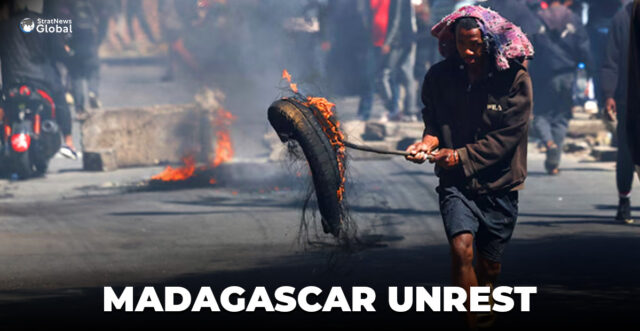Anti-government protests flared up for a third consecutive week across several Madagascar cities on Monday, with agitators now directly calling for the resignation of President Andry Rajoelina.
The protests, which began last month over basic service failures like water and power cuts, have broadened into widespread political discontent, leading police in the capital, Antananarivo, to fire teargas to disperse the crowds, many of whom were university students.
Police in Antananarivo fired teargas to disperse the marchers, a Reuters reporter said. Many were university students who seized on protests last month against water and power cuts to air broader grievances against the government.
The Reuters Tariff Watch newsletter is your daily guide to the latest global trade and tariff news. Sign up here.
Inspired by similar “Gen Z” marches in Kenya and Nepal, the protests are the largest wave of unrest on the Indian Ocean Island nation in recent years, giving voice to discontent over rampant poverty and high-level corruption.
Madagascar television stations showed images on Monday of police officers confronting protesters in the southern city of Toliara and the northern city of Diego Suarez.
Despite significant mineral wealth, biodiversity and agricultural land, Madagascar is among the poorest countries in the world, having seen income per capita fall 45% between independence in 1960 and 2020.
Rajoelina fired his cabinet last week, but many demonstrators are now demanding the 51-year-old leader resign himself.
The United Nations said that at least 22 people were killed and more than 100 injured in the initial days of the protests, figures the government has rejected.
Rajoelina said in a speech on Friday that he was ready to listen to the protesters’ grievances but ignored calls for his resignation.
A spokesperson for Rajoelina’s office told Reuters over the weekend that the protest movement was being “exploited by political actors who are seeking to destabilise the country”.
“President Rajoelina remains committed to dialogue, to accelerating solutions that improve people’s daily lives,” she said in a statement.
In a separate statement on Monday, the presidency said some civil society organisations had met Rajoelina on Saturday, without providing details.
Other organisations said in their own statement that they had refused to participate because authorities had not provided assurances that demonstrations could go ahead unhindered and that arrested protesters would be released.
(With inputs from Reuters)





